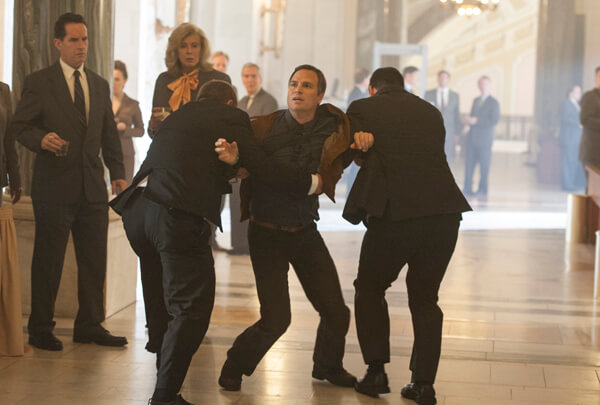BY ARTHUR S. LEONARD | In an unfortunate turnabout, the Iowa Supreme Court unanimously ruled on April 15 that Nick Rhoades, whose guilty-plea conviction to one count of criminal transmission of HIV was reversed by that court two years ago, could not bring an action for damages against the state under its Wrongful Imprisonment Statute. That law, the high court argued, does not allow claims by those who pled guilty.
The Iowa court declined to follow rulings in some other states interpreting similar statutes that have allowed such lawsuits when a guilty plea was vacated on appeal.
Rhoades met a man identified in court proceedings as A.P. — but widely reported elsewhere as Adam Plendl — through a social networking website. After exchanging messages, Plendl invited Rhoades to his home and they had unprotected oral sex but anal sex with a condom. Plendl believed Rhoades to be HIV-negative based on his online profile, but they did not discuss the issue before having sex.
Iowa Supreme Court says original guilty plea bars Nick Rhoades’ damages claim
When Plendl subsequently learned that Rhoades was HIV-positive, he contacted law enforcement and Rhoades was charged with criminal transmission of HIV under an Iowa statute subsequently repealed in part due to the publicity surrounding this case. A new law was enacted that better reflects the current science on HIV transmission.
Rhoades pled guilty to the charge and was sentenced to 25 years in prison, lifetime parole, and a requirement to register as a sex offender. No evidence was presented that Plendl was infected with HIV, and the statute at that time did not require evidence of actual transmission, merely exposure that could cause transmission.
Rhoades filed a motion to reconsider the sentence, stressing the lack of transmission, and the district court suspended the prison sentence and placed him on five years’ probation. In an application for post-conviction relief, Rhoades claimed his trial counsel provided ineffective assistance by letting him plead guilty when there was, in his view, no factual basis for the charge.
Rhoades argued that because his viral load was virtually undetectable at the time he had sex with Plendl, the chance that he would transmit the virus, even through unprotected anal sex — which was not alleged — was slight, and certainly not sufficient to meet the standard of guilt under the statute, which required “the intentional exposure of the body of one person to a bodily fluid of another person in a manner that could result in the transmission of the human immunodeficiency virus.”
This was described in the statute as “intimate contact.” At the time of his guilty plea, the trial judge asked Rhoades if he had engaged in “intimate contact” with Plendl, without any explanation by the judge or Rhoades’ trial counsel of the meaning of that term. Rhoades could well have believed he had violated the statute without having engaged in anal sex.
Although the trial and intermediate appellate courts rejected his motion, the Iowa Supreme Court in 2014 reversed because, as Justice Brent R. Appel writes in the current decision, “We concluded that the district court had used technical terms from the statute but that such conclusory terms were insufficient to establish that the defendant acknowledged facts consistent with the completion of the crime. We further noted the minutes of testimony and the pre-sentence investigation report did not provide a factual basis for the element of intimate contact.”
The Supreme Court had also concluded that “in light of advances in medicine” the record contained “insufficient evidence to show that Rhoades exchanged bodily fluids with A.P. or intentionally exposed A.P. to the disease.”
By vacating the guilty plea, the court was not concluding that Rhoades was innocent, but rather that a new trial was needed to determine his guilt, either through a properly informed guilty plea or a trial.
The state chose not to pursue another trial but instead dropped the charges.
Rhoades is now asserting a claim under Iowa law for “wrongful imprisonment.” That provision provides relief if two tests are met: “the individual did not plead guilty to the public offense charged, or to any lesser included offense, but was convicted by the court or by a jury of an offense classified as an aggravated misdemeanor or felony,” and the claimant proves “by a clear and convincing preponderance of the evidence that the claimant is actually innocent.”
The legislature, in this way, was preventing damage claims by somebody who was convicted but then got off on a technicality. The Supreme Court pointed out that Rhoades would have to prove his innocence under the law that has since been repealed in order to win relief.
The focus of the case, however, was on the interpretation of the guilty plea language.
Rhoades argued, with support from cases outside of Iowa, that a guilty plea vacated or nullified as the result of an appellate ruling should not stand in the way of a “wrongful imprisonment” claim. The Iowa court did not accept this argument.
First, it pointed out, the statutory language was clear and did not include any statement, as was found in other states’ laws, softening the guilty plea bar in certain circumstances. Appel noted that the legislature has specifically provided, in another statute, an out for those who have pled guilty but are later exonerated by DNA evidence, showing that if it “intended to provide relief to those who plead guilty, it knows how to do it.”
The court also observed that in a case resolved by a guilty plea, the lack of a trial record means there is no contemporaneous basis on which to determine whether the claimant can prove actual innocence.
Even as the court acknowledged the case against Rhoades seeking compensation lacked airtight logic, it retreated to a narrow view of its role in statutory interpretation.
“Although there are substantial arguments that a guilty plea should not disqualify a claimant from seeking compensation for wrongful imprisonment in all instances,” Appel wrote, “we conclude … that the legislature made a different judgment in 1997” when it enacted the statute. “Our job is to do the best we can in interpreting the meaning of legislation. We do not expand the scope of legislation based upon policy preferences.”
The resulting conclusion, Appel wrote, is a “narrow but not impractical or absurd result.
Rhoades is represented in this appeal by attorney Dan Johnston of Des Moines. Since the case revolves entirely around an interpretation of an Iowa statute, there appears no basis to seek further review from the US Supreme Court.



































